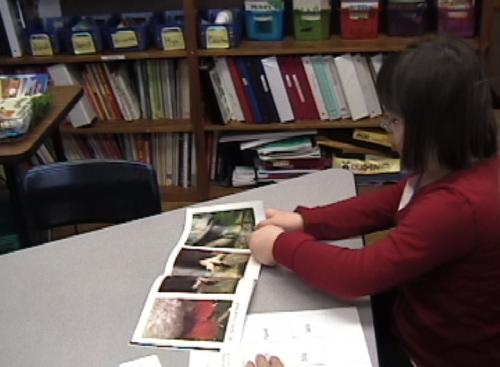Introduction

Thank you for your interest in supporting literacy learning for all students--including those with moderate, severe or multiple disabilities!
It is our experience that many teachers (and many teacher education instructors) have little experience with learners with developmental or multiple disabilities. Many teachers feel under-prepared to teach students with these characteristics; and many college faculty members feel unprepared to "teach about teaching" these students. Some educators may have inaccurate perceptions about these students' abilities to learn about and benefit from literacy opportunities. We hope these resources will help teachers and teacher educators support high quality literacy education for all learners.
GOALS OF THIS ONLINE BOOK
Literacy is a key foundation skill for all learners. We hope these resources will help:
1. Teachers, teacher candidates and teacher preparation faculty to recognize how our current knowledge of effective, research-based literacy practices applies to learners with moderate/ severe, or multiple disabilities.
2. To provide a framework and ideas for special educators or other teachers who may bring a limited foundation in teaching beginning literacy; to help them to "get started" right away and to learn more about literacy education through implementing routines and instruction from a "frame" of research based, effective literacy practices with students they serve who have moderate/severe, or multiple disabilities.
TEACHER AUDIENCE
These resources are intended for:
- special educators and classroom teachers who serve one or more student(s) who are described as having moderate, severe or multiple disabilities
- pre-service teacher candidates (special education and general education, elementary and secondary)
- teacher preparation faculty (special education, literacy education, and general education)
- education professionals who support inservice teachers' professional development in literacy (for all students) and/or teaching students with disabilities
FOCUS STUDENTS
This site focuses on students who have developmental disabilities who may be described as having "moderate/ severe" cognitive or intellectual abilities or multiple disabilities. These may be students who are identified or described as having:
- Down Syndrome
- autism (who present more severe challenges)
- moderate/severe/or profound "mental retardation" (or "cognitive" or "intellectual" disabilities)
- physical disabilities such as cerebral palsy and mental retardation / cognitive/intellectual disabilities
- sensory disabilities such as vision or hearing loss and mental retardation/ cognitive disabilities
- limited or no verbal communication, who do or do not yet use augmentative or assistive communication system
- developmental disabilities such as autism or intellectual disabilities and who also present challenging behaviors
The resources and ideas focus on teaching students who demonstrate characteristics of "EMERGENT" and "EARLY" literacy learners. That is, students who:
do not yet demonstrate or have limited knowledge of/ experience with reading, writing, words, letters, sounds, how texts work;
OR
demonstrate some early literacy knowledge in some areas; but their literacy instruction "levels" might be described by schools as "kindergarten level," "first grade level" or earlier.
The CHRONOLOGICAL ages of students do NOT matter. These resources can be effectively used to plan and support literacy learning for elementary, middle school, high school (or even adult) learners who have the above "disability" characteristics and demonstrate emergent or early literacy abilities.
LEARNING CONTEXTS
While we believe that it is possible for teams to develop and provide rich, meaningful, appropriate literacy opportunities for all learners in inclusive contexts, these resources can support literacy planning and instruction in both inclusive and special education contexts. Literacy is too important to deny access to any students based on their current educational placement.
ACCESS TO WEBSITE RESOURCES
MOST of the resources on this site are available to anyone who wishes to develop or improve literacy opportunities for students with significant disabilities. However, due to confidentiality and parent permission, some video clips that provide examples of some of the practices and routines which are described, are available to a limited audience of teacher preparation faculty and NY State Education staff who are members of the Task Force on Quality Inclusive Schooling.
PERMISSION TO COPY/SHARE THESE RESOURCES
Permission is granted to copy content material (excluding any video clips) in this site for educational, non-commercial purposes provided the source and authors (Roberta Schnorr and Amanda Fenlon) are acknowledged.
- Printer-friendly version
- Login to post comments


